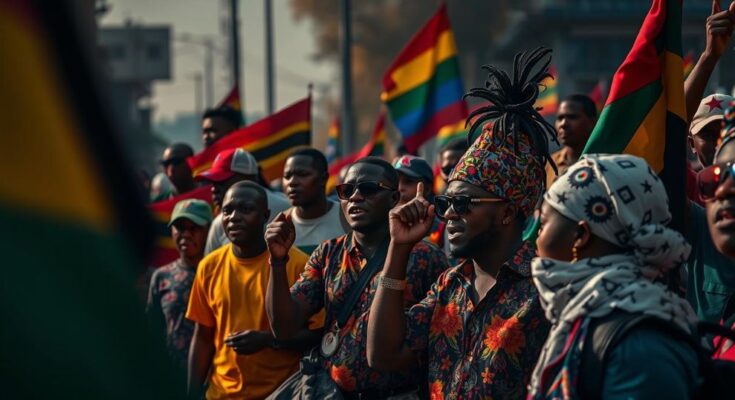Protests continue in Mozambique post-election, primarily taking form through nightly pot-banging demonstrations known as “panelaco,” in response to widespread dissatisfaction with perceived electoral fraud. Following the announcement of Daniel Chapo’s election victory by the ruling Frelimo party, public unrest has escalated into calls for shutdowns affecting economic activities and leading to violent confrontations with police. The situation has raised significant concerns regarding government accountability and ongoing socioeconomic strife.
Following Mozambique’s contentious elections, protests persistently disrupt the nation, manifesting in creative forms, including a nightly demonstration known as “panelaco,” which involves residents banging pots and pans. This form of protest emerged after the ruling Front for the Liberation of Mozambique (Frelimo) declared Daniel Chapo as president with 71% of the votes. Opposition leader Venancio Mondlane and his supporters contest these results, leading to widespread unrest and significant economic repercussions across the country. In the wake of the October 9 elections, tolls of dissatisfaction have risen sharply among the populace, especially as the National Election Commission acknowledged numerous irregularities. Mondlane’s rejection of the results and subsequent assassination of his attorney exacerbated tensions. The protests have been characterized by calls to shut down critical economic sectors, resulting in deadly confrontations with law enforcement. Students and workers, frustrated with opressive governmental measures, have joined the protests, showing solidarity through coordinated pot-banging events that symbolize their dissent against perceived injustices. However, these demonstrations have led to heavier police responses, which many view as disproportionate and aggressive, breeding further resentment among protesters. As protests continue, they reveal profound unease regarding the government and the economic stagnation that has plagued Mozambique for years. The unrest has brought about severe economic challenges, affecting food supplies due to border disruptions from protests, leading to shortages. The regional implications have prompted the Southern African Development Community to convene for an emergency summit to discuss the escalating crisis. In summary, the persistence of these protests highlights a significant discontent with the current political and economic situation in Mozambique that is unlikely to fade easily.
Mozambique has faced overwhelming tension following its recent elections, in which the announcement of a controversial victory for Daniel Chapo of the ruling Frelimo party prompted significant backlash. The elections, characterized by complaints of fraud and irregularities from opposition leaders, particularly Venancio Mondlane, have led to ongoing protests across various cities. The protests have evolved from mere public displays of frustration into organized movements impacting key economic sectors and regional commerce, suggesting a burgeoning desire for change among the populace. The government’s heavy-handed reaction to dissent further complicates the situation and raises alarms about potential violence reminiscent of past civil strife. These protests underscore broader socioeconomic grievances that beyond electoral disputes, highlighting stagnant economic conditions and widespread disillusionment with governance.
The ongoing protests in Mozambique signify a profound discontent regarding the electoral process and the prevailing economic conditions. The innovative forms of dissent, such as the pot-banging protests, demonstrate a collective voice arising from various segments of society, united against perceived governmental oppression and electoral malfeasance. With significant economic impacts already evident, both locally and regionally, Mozambique faces a critical juncture that necessitates urgent dialogue and resolution to restore stability and public trust in its institutions.
Original Source: www.aljazeera.com




